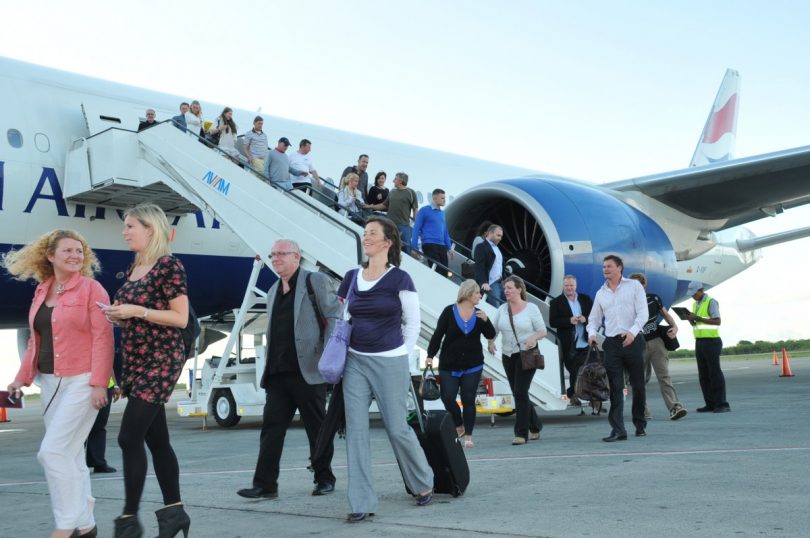Por todo o mundo, a imigração e os refugiados são um tema quente. A Europa está bloqueada no debate de como lidar com os milhões de pessoas que para aí pretendem migrar. Nos EUA um debate semelhante decorre por ocasião do processo eleitoral para as eleições presidenciais. Este artigo não trata do problema da imigração e dos refugiados, em si, mas procura analisar o impacto das movimentações de pessoas nas atividades turísticas.
O Turismo é muito mais que o simples movimento de pessoas de um local para outro. É também o intercâmbio de culturas. As movimentações turísticas não têm apenas a ver com pessoas que vão visitar outros lugares, porque as empresas turísticas recorrem frequentemente à “importação” de trabalhadores. Estas “pessoas de outras terras” não prestam somente os serviços necessários, como dão um toque de exotismo ou de internacionalização nos seus locais de emprego. Por exemplo, as empresas de cruzeiros sempre procuraram ter tripulações pluri-nacionais e pluri-linguísticas. Estes trabalhadores internacionais têm a oportunidade de viajar pelo mundo e dão um “ar” e uma “joie de vivre” especiais à experiência do cruzeiro. Em outros casos, pessoas de um país que prestam serviços em outro, se beneficiam normalmente de um nível salarial mais alto, além da experiência de ter vivido no exterior.
Infelizmente, devido à criminalidade internacional e ao terrorismo, as nossas possibilidades de viajar livremente ou de ter experiências de trabalho fora do nosso país têm de ser reavaliadas e em alguns casos deixaram de existir. A Tourism Tidbits deixa algumas sugestões para manter uma atividade de acolhimento aberta, mesmo seguindo padrões de segurança elevados. Por favor, tenha em consideração que cada destino tem as suas características próprias. A informação abaixo apenas procura incentivar um diálogo criativo, não indo até à formulação de recomendações específicas. Dessa forma, recomendamos sempre consultar as autoridades locais antes de tomar qualquer iniciativa específica.
– Crie uma Polícia Turística competente. A palavra-chave é competente. Poucos destinos turísticos têm uma Polícia Turística e muitos desses não a têm a mesma de forma treinada por especialistas, tanto na vertente policial como na turística. A Polícia Turística precisa estar preparada para lidar com muitas situações além de simples batedores de carteira. Precisa ser especializada em tudo, desde cibersegurança até à segurança hoteleira, desde os assuntos de imigração até aos de trabalho ilegal. A Polícia Turística também tem que saber trabalhar em conjunto com os outros profissionais de segurança, em especial com os que trabalham na segurança privada. Precisam ainda ter conhecimentos em Marketing, já que uma decisão pode fazer sentido em termos de segurança, mas, se destruir a imagem de uma cidade ou um país, será contraproducente. Por exemplo, é essencial saber quando a Polícia deve estar fardada e quando não. Os turistas tendem a gastar mais quando sentem uma presença policial, em havendo poucos agentes fardados pode-se perder muito em todos os sentidos.
– Crie uma Comissão de Imigração Turística. Esta Comissão deve estar composta por especialistas da polícia, das autoridades de imigração e aduaneiras, da hotelaria e do turismo, bem como do governo e do legislativo locais ou regionais. Garanta que as leis têm em conta tanto as necessidades em termos de segurança quanto econômicos.
– Aprenda com os outros. Assista a conferências sobre segurança turística, troque correspondência com colegas e aprenda o que deu resultado e o que não deu em matéria de segurança turística. Depois, adapte esses ensinamentos às suas necessidades locais. Tenha em atenção que algumas medidas podem não ter especificidades geográficas ou culturais, enquanto outras que funcionam em alguns locais já não servem em outros. Inclusive, o que está errado em um destino pode não o estar em outro.
– Torne os procedimentos de imigração rigorosos, sem deixarem de ser simpáticos. O controle das fronteiras e de alfândega é a primeira linha de defesa de qualquer país. É essencial que aqueles que aí trabalham tenham sido cuidadosamente selecionados, recebam o devido prestígio e correspondam aos tipos de personalidade certos. Pessoas que tendam a ser introvertidas são menos adequadas a tais tarefas que as extrovertidas. A conversa e o sorriso são uma parte essencial no que se refere ao reconhecimento de segurança. As perguntas devem ser diretas e precisas, com acompanhamento de perfis biométricos e psicológicos. Estes agentes têm de recordar sempre que são os protetores e os incentivadores do Turismo. Estes agentes têm de ser cuidadosos e precavidos, corteses e rigorosos.
– Reveja todos os formulários de entrada. Normalmente, os formulários ou contêm questões sem sentido útil ou parecem ter sido concebidos para incomodar os turistas. Muitos formulários são difíceis de ler, bem como impossíveis de preencher a bordo de um avião. O resultado é que muitas pessoas prestam informações incorretas. É melhor obter menos informações corretas, do que muitas informações imprecisas. Dessa forma, não duplique as perguntas e, se a informação não for necessária, elimine-a.
– Crie protocolos para uma iniciativa destinada a trabalhadores estrangeiros. Existem duas vertentes diferentes para lidar com trabalhadores imigrantes. A primeira deve orientar aqueles que querem imigrar para trabalhar, e a outra aqueles que desejam trabalhar depois de já terem imigrado.
Primeiro passo
Não dependa do seu Governo para identificar as pessoas problemáticas. Isto significa que as empresas turísticas têm a responsabilidade de verificar tudo, desde as redes sociais até à reputação. Um dos maiores desafios atuais no que se refere aos Recursos Humanos consiste em identificar quem está disponível para assumir os Valores do país de acolhimento, e também os do Turismo.
Faça aos potenciais empregados perguntas diretas. Quanto mais diretas forem as perguntas mais fácil será avaliar a pessoa, incluindo a linguagem corporal.
Não prejulgue as pessoas. Existem boas e más pessoas em todos os países, grupos, religiões e gêneros. Uma mulher pode ser tão violenta quanto um homem. Julgue cada pessoa pelos seus méritos.
Fique atento desde o momento da contratação. Se algo destoar, use os mesmos critérios que empregaria na avaliação de riscos e não permita que o discurso ou as ações do “politicamente correto” influenciem no modo como enfrentará essa situação.
Segundo passo
Garanta que a pessoa é bem integrada na cidade de acolhimento e ajude-a a combater a solidão. Não é fácil ser um estranho em uma terra estranha. Entregar um cheque não basta. Garanta que a pessoa tenha oportunidades para fazer amizades e ter as alegrias próprias da sua cultura de origem.
Crie uma iniciativa com tutores ou parceiros. Tais iniciativas não só agregam valor à experiência dos imigrantes como previnem problemas de alienação, dos quais podem resultar em tragédias. Quanto melhor integrada estiver a pessoa na sociedade de acolhimento, menores serão as possibilidades de ter vontade de prejudicar quem a recebeu.
Compreenda as culturas. Frequentemente, o que parece ser violento para uma cultura não o é para outra. Apesar de um imigrante se ver obrigado a viver de acordo com as regras da nova cultura que o acolheu, um bom entendimento também da cultura do imigrante pode evitar falhas de comunicação e mal-entendidos.
Fonte: TOURISM & MORE’S “TOURISM TIDBITS” – edição de maio de 2016







